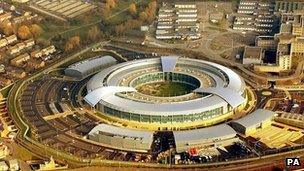Spy apprenticeship: Government launches new scheme
- Published

Spies could be recruited for the government's intelligence agency at GCHQ
The government has launched an apprenticeship scheme for spies which will target young people regardless of their academic background.
Foreign Secretary William Hague announced the scheme during a visit to Bletchley Park where codebreakers helped to shorten World War II.
Until now going to university was traditionally seen as the route into one of the intelligence agencies.
Mr Hague also praised those who worked at Bletchley Park in the war.
The foreign secretary spoke of the need to find and nurture the next generation of codebreakers and computer scientists to work against modern threats.
'Key to success'
The aim of the scheme is to find up to 100 new recruits, primarily for the communications intelligence agency GCHQ in Cheltenham, the successor to Bletchley Park.
They could also find their way into the Secret Intelligence Service (MI6) or the Security Service (MI5).
The scheme will focus on attracting talented young people who may have vocational qualifications in science, technology or engineering, but who do not necessarily have a degree.
Mr Hague said: "Bletchley Park was the scene of one of the finest achievements in our nation's history. Without the codebreaking geniuses of Bletchley Park our country would have been at a devastating disadvantage during the war.
"Young people are the key to our country's future success, just as they were during the war. It will be the young innovators of this generation who will help keep our country safe in years to come against threats which are every bit as serious as some of those confronted in the past."
The Foreign Office said there was a need to harness experts from the "Xbox generation" who had grown up in a world of "social media, global connectivity and interactive gaming".
The Single Intelligence Account apprenticeship scheme involves a two-year foundation degree course in communications, security and engineering at De Montfort University in Leicester.
'Science interest'
Maths professor Barry Cooper from Leeds University, who is an expert on Bletchley codebeaker Alan Turing, welcomed the initiative.
Prof Cooper told the BBC: "The scientific legacy that has come out of Britain is really quite amazing and important to us economically, and the contribution that we've made is important to the world.
"A lot of it depends on young people - it depends on people being interested in the science and having the means to pursue their interests.
"The way in which the government is now thinking about this seems really encouraging."
Mr Hague announced £480,000 of Foreign Office funding that will unlock £5m of National Lottery heritage money for preservation work at Bletchley Park.
Iain Standen, chief executive of the Bletchley Park Trust, said it was "enormously grateful" for the investment.
Mr Hague also said there would be a national online cipher competition for schools, run by the maths department at Southampton University, with a top prize of £1,000.
- Published29 May 2012
- Published2 April 2012
- Published12 March 2012
- Published1 December 2011